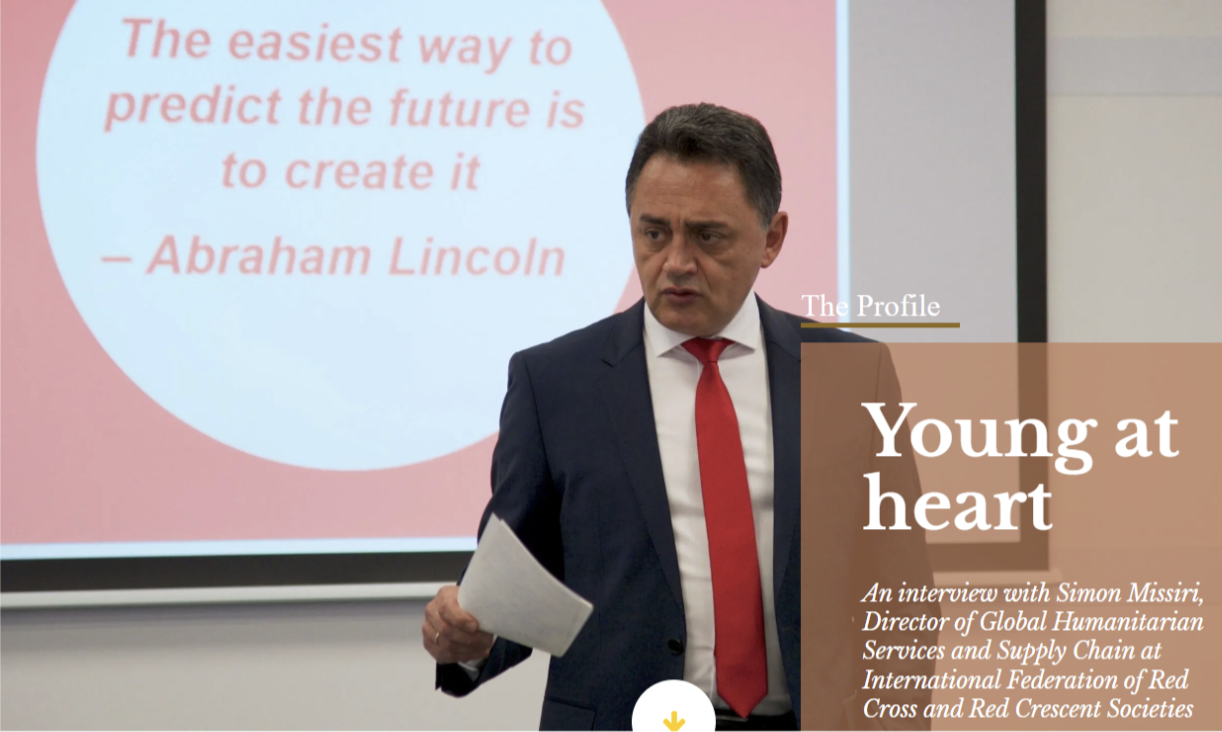International Federation of the Red Cross’ (IFRC) Simon Missiri talks to QS Insights Magazine about serving in the humanitarian field, going back to school and how he leads more than 70 employees around the world.
By Afifah Darke, Deputy Editor
Simon Missiri has been with the International Federation of Red Cross and Red Crescent Societies (IFRC) for 35 years, holding 14 distinct positions without ever actively applying for any. Now the Special Representative IFRC and Director of Global Humanitarian Services and Supply Chain, Missiri emphasizes the significance of being open to opportunities and the value of intrinsic leadership skills. At 64, he believes in staying mentally agile, demonstrated by his enrollment in the International Master’s Program for Managers (IMPM) in 2000. Despite offers from major companies, Missiri remains with IFRC, valuing meaningful work and the impact it has on the world.
This article was first published by QS, to read the original interview please click here
Transforming Humanitarian Aid Through Supply Chain Management

When the unthinkable occurs; earthquakes, conflict and natural disasters, often a global effort is required to come to the aid of those at the centre of such circumstances. International aid organisations provide the means for global communities to pull together to care for people and communities in the aftermath of tragedy.
Whilst many of us might donate readily to such causes, little thought is given to how our support is translated into action. Simon Missiri, Director of Global Humanitarian Services and Supply Chain Management for the International Federation of Red Cross and Red Crescent Societies (IFRC) and IMPM alumnus makes it his mission to ensure global aid efforts are not made in vain.
Simon has had a remarkable career dedicated to humanitarian work. His diverse background and evolving roles have shaped his unique perspective on the importance of supply chain management in delivering aid to vulnerable populations.
Simon’s journey into the humanitarian field began with curiosity. He embarked on his first mission to Sudan in 1987, which opened his eyes to the world of international aid. Since then, Simon has held various positions within the International Federation of Red Cross and Red Crescent Societies (IFRC), ranging from Finance Manager to Regional Director for Africa, Europe, and Asia Pacific. Currently, he serves as the Director of Global Humanitarian Services and Supply Chain Management, where he oversees the critical task of ensuring the efficient and timely delivery of aid during emergencies. His role involves managing a global team, optimising supply chains, coordinating with Red Cross and Red Crescent Societies worldwide, and mobilising responses to crises.
Key to Simon’s work is the ability to effectively collaborate with Red Cross and Red Crescent Societies in different countries. Their dedicated staff and volunteers form the “underlining machine” of IFRC’s operations on the ground, as while IFRC supports and coordinates responses, it is the local societies that provide direct assistance and implement relief efforts.
Supply chain management plays a vital role in humanitarian response, serving as the backbone of aid. Simon emphasises that when disasters strike, vulnerable populations require immediate access to essential resources such as shelter food, and water. Indeed, logistics within IFRC accounts for approximately 60% of the organisation’s budget, focusing on optimising stock levels, establishing framework agreements with suppliers and managing logistics and transportation. Simon’s role involves mobilising resources, establishing supply lines, and ensuring effective coordination with national societies to maximise the impact of humanitarian interventions.
Supply chain management, in humanitarian contexts, faces challenges similar to those in other industries, such as disruptions in transportation, rising costs and shortages of essential items. Additionally, managing unforeseen events presents a unique set of difficulties; examples like the war in Ukraine and the global COVID-19 pandemic, have demonstrated the demand for adaptive and innovative approaches to getting vital resources to places and people in need. To overcome, these challenges requires meticulous planning, risk management, and the ability to “manage the unthinkable.”
Navigating an unpredictable global landscape, and relationships with a global team required more than having the right intentions at heart. Whilst Simon’s decision to undertake the IMPM was driven by the initiative of the Secretary-General and the organisation’s belief in investing in leadership development, his motivation stemmed from a desire to enhance his leadership skills, broaden his perspective, and learn from renowned professors and fellow professionals in order to be more effective in his own work. The IMPM offered a unique opportunity to explore new ideas and approaches, challenge traditional mindsets, and develop a more holistic understanding of management in a global context.
Simon highlights three key takeaways from his IMPM experience: Reflection, Margins and Legacy.
The first highlights the significance of adopting a holistic leadership approach. During his time on the IMM programme, Simon saw how effective leadership extends beyond traditional management skills and requires a broader perspective that considers various viewpoints, and skillsets and incorporates diverse ideas. The IMPM emphasises the importance of integrating different leadership models and techniques, allowing Simon to cultivate a well-rounded and adaptable approach that allows him to drive more successful international aid operations in diverse organisational contexts, which is very often for an NGO as global as the IFRC.
Henry Minztberg gave Simon his second key takeaway: “The richest of all life is on the margins.” Whether that’s a border between countries, or the consensus between two ideas, often the best path forward is the harmony between various worlds, reiterating lessons learned in the Worldly mindset.
Finally, a key goal of Simon’s work is to create and leave something tangible behind – a legacy for others to benefit from and build upon. This lesson comes from many discussions throughout the IMPM on how the footprints we leave behind are the greatest representations of our work. After time spent on the IMPM’s reflective mindset, considering his own professional footprint, Simon was inspired to develop the digital infrastructure for the IFRC – helping to ensure that international aid can continue to keep pace with new ideas, technologies and resources and go on to reach those in need in new and improved ways.
Supply chain management serves as the backbone of aid delivery during crises, and its leadership is the brain. Prioritising the long-term needs of affected communities, Simon’s leadership approach, honed through the IMPM programme, embraces inclusivity, collaboration, and the integration of diverse ideas.
